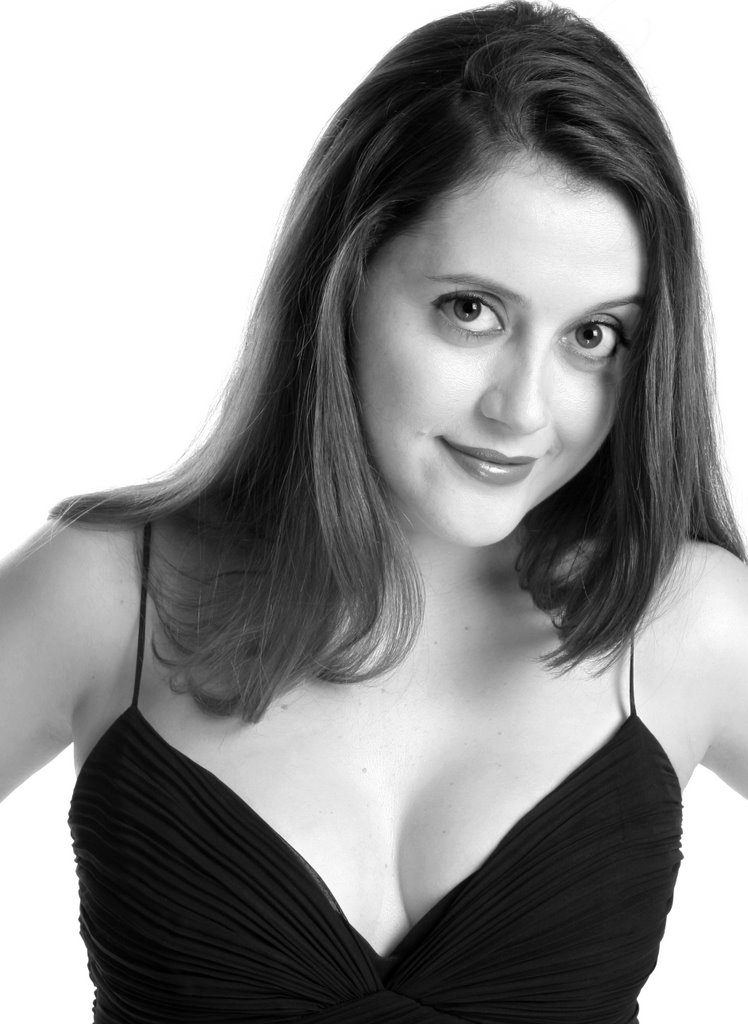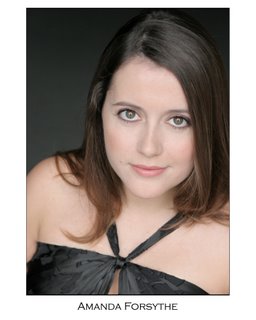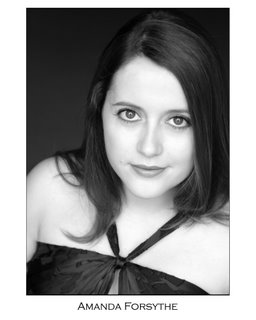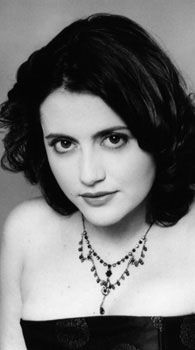Handel's "Semele"The Wall Street Journal: "The most sparkling moments came from the bright, lively soprano of Amanda Forsythe, in the small role of Iris, Juno's servant."
The Boston Globe: "Amanda Forsythe poured out an exceptional chrome-bright soprano and made the comedic most of Juno's eagerly devious assistant Iris."
The Bostonist: "Reclining on a banquet table, Forsythe made the most of Iris's air "There from mortal cares retiring," showing off a strong, delicious voice."
Handel's "Messiah"Times-Picayune: "Forsythe delivered the greatest pleasure on Thursday. She treated the LPO as a springboard for an amazing voice, loping and leaping through fast passages, gracefully rising to the highest notes, exploring warm timbres and stroking each word in adagios. Where Handel required melisma, Forsythe delivered flowing, sustained phrases that wrung every ounce of feeling from beautiful airs such as "I know that my Redeemer liveth. " She made trilling ornament seem essential to a broader architectural conception and conjured the full dramatic power of Handel's music, making it clear why it has endured for centuries."
Handel’s “Ariodante”Financial Times: "Amanda Forsythe (Dalinda) is the discovery of the evening: songbird voice, impeccable tuning and, like so many Americans, totally at home on stage."
Opera News: "Amanda Forsythe's Dalinda was on a similar level of achievement. Dressed in a sensible gray suit, she portrayed a girl whose burgeoning sexual appetite led her astray: just one look at the dark Byronic locks of Varduhi Abrahamyan's deep-voiced Polinesso, and she was lost."
Le Figaro: "Dans le role clé de Dalinda, sa servante, qui cède aux avances du scélérat Polinesso, la jeune Amanda Forsythe faisait ses débuts au Grand Théâtre. Elle a montré de très grandes qualités vocales."
Le Temps: "Amanda Forsythe fait preuve d'une belle souplesse."
Forum Opera: La jeune soprano américaine Amanda Forsythe que nous avions remarquée à Pesaro dans Le voyage à Reims tient ses promesses en Dalinda. Le timbre est agréable, la voix légère mais bien projetée et la technique vocale déjà très assurée.
Tribune de Geneve: "Dans cet écrin de rêve, les voix féminines se situent au plus haut. Joyce Di Donato…place la barre à grande altitude. Mais Patricia Petitbon (Ginevra bouleversante et charismatique) et Amanda Forsythe (Dalinda à la musicalité vibrante) la suivent de près."
La Libre Belgique: "Deux jeunes chanteuses, Amanda Forsythe, soprano (Dalinda) et Varduhi Abrahamyan, alto (Polinesso), font une première apparition remarquée dans la maison."
Anaclasse.com: "L'attachante Dalinda d'Amanda Forsythe prend vite de l'assurance, donnant un Il primo ardor (1er acte) sensible et surtout un Neghittosi, or voi che fate d'une agilité confondante."
Resmusica.com: “Amanda Forsythe (Dalinda) respire la fraîcheur, et c’est un régal de l’entendre vocaliser sans apparente difficulté.”
Concerto.net: "On saura donc gré à la direction du Grand Théâtre d’avoir réuni une distribution exceptionnelle, à la tête de laquelle il convient de citer Joyce DiDonato dans le rôle-titre, à la virtuosité époustouflante et à l’aplomb scénique confondant. Patricia Petibon en Ginevra et Amanda Forsythe en Dalinda ne lui cèdent en rien, ni vocalement ni scéniquement."
OperaClick: "Meno note, anche se timbricamente pertinenti ai rispettivi ruoli, sono le voci di Amanda Forsythe e di Varduhi Abrahamyan. La prima e un soprano leggero che con la sua voce chiara e fresca e perfetta nel dar vita alla femminilita superficiale e capricciosa di Dalinda."
Lully’s “Thésée” (Nominee for the 50th Annual Grammy™ Awards)
Fanfare Magazine: “Finally, as both Minerva and her Grand Priestess (asensible conflation of interests), Amanda Forsythe is among the most effective singers in the lot. She offers a brightly forward, almost heroic tone, vocal dexterity of a fine order, and the strongest response amongthe cast to the text.”
San Francisco Chronicle: "A passage near the end of Act 1 demonstrates...a fluid exchange between the High Priestess of Minerva (arresting soprano Amanda Forsythe) and a quietly sumptuous Chorus of Priestesses."
Rossini's "Il Viaggio a Reims" The Stage (UK):"Amanda Forsythe, the outstanding Corinna, is technically in command of the role. Required to sing her final aria from the front stalls, she delivered All’ombra ammena flawlessly with every run in place, the legato lines seamless, the vocal line expressively shaped in support of the text. It was perfection."
Forum Opéra (France): "Trois de ces jeunes chanteurs nous ont semblé particulièrement à suivre : la soprano Amanda Forsythe (Corinna) pour son timbre velouté, sa musicalité et sa légèreté naturelle agrémentée par un délicat vibrato...Chanté du balcon, l’aria « Arpa gentile », avec son exquis legato, offre un moment de grâce qu’on voudrait ne pas voir finir..."
L'opera (Italy): "...segnaliamo le voci che ci sono sembrate particolarmente degne di nota, a partire dalla bravissima Amanda Forsythe, Corinna, bella voce, di timbro morbidissimo e sapientemente gestita sul fiato."
Vivaldi's "Juditha Triumphans" The Boston Globe: "...but the singer who inhabited her character most completely was Amanda Forsythe as Vagaus, the general's servant. Her singing was self-possessed, her tone light and pure, and her coloratura was not only nimble but well-integrated into the expressive arc of the particular aria rather than serving as merely decorative filigree. When she swore revenge through the lightning runs of "Armatae face," you really believed her."
Handel's "Messiah"The Cleveland Plain-Dealer: "The vocal soloists performed their arias and duets directly to the audience, as if they were visionary storytellers. Amanda Forsythe’s shining soprano graced or flew across every phrase."
Peter Eötvös’ "Angels in America"
The New York Times: “This is not easy music. Principals sang with confidence...Amanda Forsythe’s Angel was powerfully sung.”
The Boston Globe: “Amanda Forsythe’s voice soared tirelessly aloft as the Angel.”
The Boston Herald: “Amanda Forsythe lends heavenly voice to the Angel.”
EDGE Boston: “Amanda Forsythe provides the opera’s most memorable music as the Angel, and she sings it gorgeously.”
Opera News: “the Angel [was] sung with edgy brilliance by Amanda Forsythe.”
The Financial Times (UK): “Amanda Forsythe sang radiantly as the Angel.”
InNewsWeekly: “the Angel [was] sung in an appropriately glorious soprano by Amanda Forsythe.”
Musical America: “Amanda Forsythe sang gorgeously as the Angel.”
Osvaldo Golijov’s "Ainadamar"
Los Angeles Times: “ Nor was there any escaping the raw passion of the young Margarita (Amanda Forsythe).”
San Francisco CV: “Amanda Forsythe, with a brilliant coloratura, [was] the third leading singer as the young Margarita”
Musical America: “as the young Xirgu, Amanda Forsythe complemented Upshaw beautifully.”
The Financial Times: “Amanda Forsythe sang with sparkling clarity as [Dawn Upshaw’s] younger incarnation.”
The New Yorker: “Amanda Forsythe showed [a] crystalline, finely expressive voice [as] Young Margarita.”
The Boston Globe: “wonderful performance…by sweet-voiced soprano Amanda Forsythe as Young Margarita.”
The Boston Herald: “Soprano Amanda Forsythe completed the trio of principals with a charming performance as the Young Margarita.”
The New York Times: “soprano Amanda Forsythe as the young Margarita [was] also impressive.”
Purcell’s "The Fairy Queen"
The Boston Globe: “The soloists were highly agreeable...elegant, sweet-voiced, and nimble, Forsythe excelled in the coloratura favorite “Hark! the echoing air,” and to her also fell the core’s most eloquent moment “The Plaint.”
Pergolesi’s "La Serva Padrona"
The Boston Globe: “As in any opera, the singers are the essential ingredient, though here the emphasis is as much on their ability to animate their characters as on vocal skill. And these concerts were blessed by the presence of David Kravitz and Amanda Forsythe. Both are wonderful singers – Kravitz’s generous baritone was a great foil for Forsythe’s light, vivid soprano. But more important, they came across as brilliantly natural comic actors.”
The Boston Herald: “Acted out cleverly…the outstanding newcomer Forsythe won full audience admiration…Forsythe has the gift. She sings early music with clarity and flawless ease…”
Handel’s "Israel in Egypt"
The Boston Herald: “But it was young soprano Amanda Forsythe who ruled the stage, singing with a gorgeous creamy tone and demonstrating vivid coloratura when she had the chance.”
The Boston Phoenix: with the most assured singing coming…in the several star turns by the glittering young coloratura soprano Amanda Forsythe.”
Pauline Viardot’s "Cendrillon"
Opera News: “Cendrillon was sung by the wide-eyed, wondrous soprano Amanda Forsythe, with limpid tone and lovely, soft high notes.”
The Journal News: “Soprano Amanda Forsythe played Cinderella, lowly femme de chamber with winsome understatement, and then Cinderella, belle of the ball, with fulfilling blossom and blush. Floating high notes, radiant vibrato, and clear, warm tone, Forsythe wore the glass slipper gracefully.”
Handel’s "Alcina"
Opera News: “Young Amanda Forsythe made a strong impression as Oberto. Forsythe’s pure tone and sweetly tapered phrases made for a moving ‘Chi m’insegna’ and she tossed off the fireworks in ‘Barbara’ with real panache.”
The Boston Globe: “These arias demand super-singers, and Pearlman had assembled several. Amanda Forsythe was captivating in a role originally performed by a 15-year-old boy soprano; she sang with spunk.”
Bach's "Coffee Cantata"The Boston Herald: “Pearlman staged it as an opera buffa, calling on the significant acting skills of his singers. Espresso cups tempted Forsythe from both sides of the stage, and she did her best to turn the beverage into a near-sexual object of desire (her coy stage presence and stunning coffee-colored strapped dress helped). All three sang with distinction as well. Forsythe’s voice will bear close watching: She has a light and airy instrument, quite pleasing and unforced.” Monteverdi's "Il Ritorno d'Ulisse"Opera News: “As Amore, Amanda Forsythe showed off her wonderful agility and silvery top notes.”






